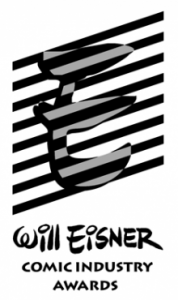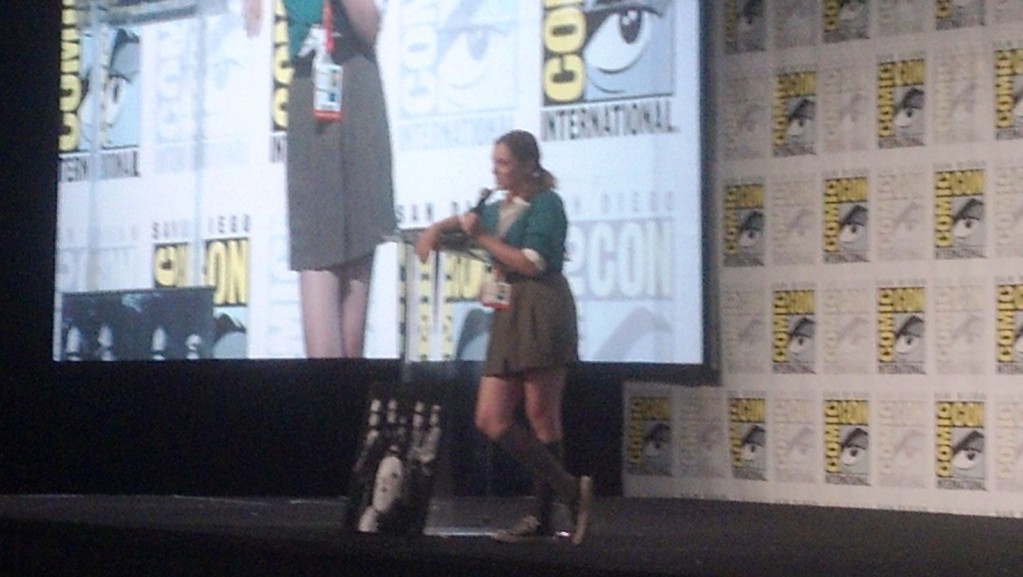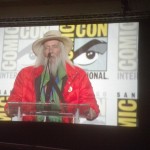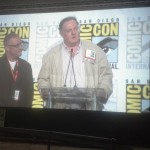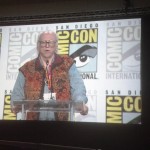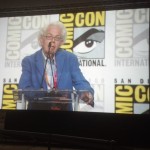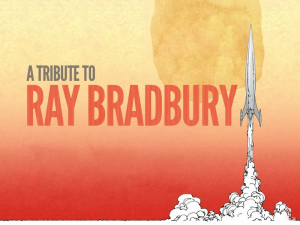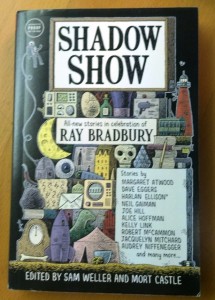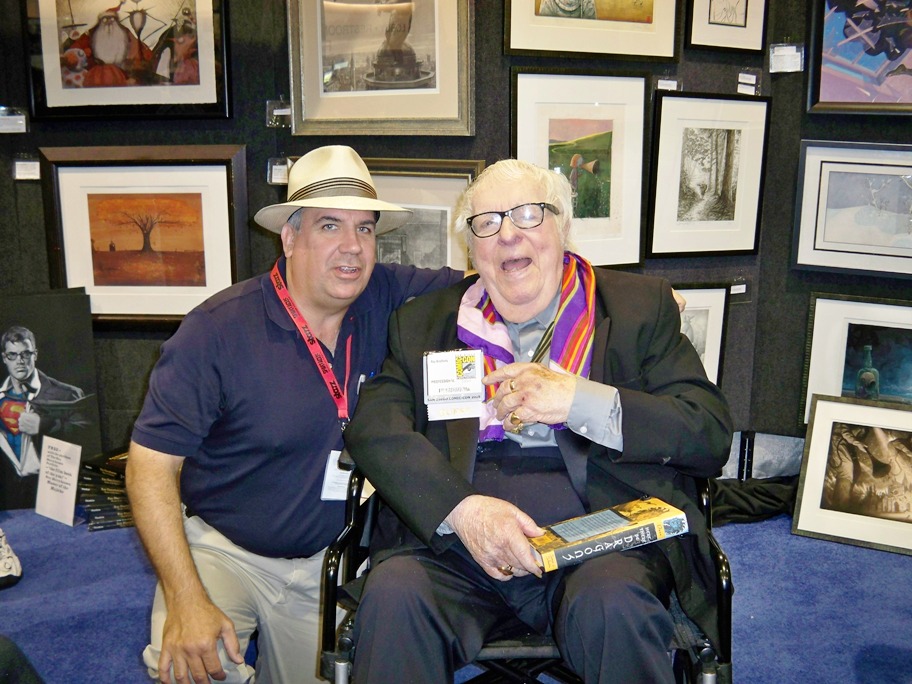The San Diego Comic-Con has finally responded to GeeksForCONsent.org’s petition demanding that Comic-Con create a formal anti-harassment policy.
The petition’s organizers say Comic-Con’s existing Code of Conduct is inadequate:
Cons should be about celebrating our favorite games, stories and characters freely and without judgment. But for many fangirls, women and LGBTQ cosplayers, going to cons often includes sexual assault and harassment. Comic Con has refused to create a full harassment policy. Will you join us in demanding a harassment-free Comic Con in 2014?
Launched in mid-May, the petition now has 2,375 signatures.
The Comic-Con Code of Conduct reads:
Code of Conduct
Attendees must respect common sense rules for public behavior, personal interaction, common courtesy, and respect for private property. Harassing or offensive behavior will not be tolerated. Comic-Con reserves the right to revoke, without refund, the membership and badge of any attendee not in compliance with this policy. Persons finding themselves in a situation where they feel their safety is at risk or who become aware of an attendee not in compliance with this policy should immediately locate a member of security, or a staff member, so that the matter can be handled in an expeditious manner.
Geeks For CONsent is looking for upgrades in the policy statement, the way it’s communicated to attendees, and how volunteers are trained:
We’re asking Comic Con San Diego to include the following in a formal anti-harassment policy:
–A harassment reporting mechanism and visible, easy to find on-site support for people who report harassment;
–Signs throughout the convention publicizing the harassment policy and zero-tolerance enforcement mechanisms;
–Information for attendees on how to report harassment; and
–A one hour training for volunteers on how to respond to harassment reports.
The petition’s creators have been in the news agitating for a public response from the con. Finally, on June 3, Comic-Con spokesperson David Glanzer defended the Code of Conduct on the air with NBC San Diego. He doesn’t feel the it is lacking, rather, he says it is “broad by design.”
“The fact of the matter is the broadness of the policy allows us to take more action than if we were specific. If we said ‘A, B, C, D was not allowed, what if somebody tries to circumvent that?’” said Glanzer who points to the heavy security and police presence as proof Comic-Con doesn’t take harassment claims lightly.
“The reports we’ve gotten have been few and far between.”
The need for conventions to have anti-harassment policies, in the words of Susana Polo, is that without clear paths to reporting harassment, con staff trained or experienced in how to receive such claims in a professional manner, and clear rules for attendees to follow, both reporting and creating consequences for inappropriate behavior becomes very difficult.
Lisa Granshaw wrote on The Daily Dot:
Facing harassment at conventions is unfortunately all too common for many cosplayers. Women especially encounter those who feel these events gives them the right to treat cosplayers as sexual objects instead of people. This is why it’s important for conventions to have firm anti-harassment policies in place and services to help those who feel threatened or uncomfortable.
Jon Voisey, The Angry Astronomer, adds:
Their real purpose is to send messages. They send a message to potential victims and aggressors that they feel this is an important enough issue to address specifically. This makes people who may be victims feel safer. It puts aggressors on note. Good policies also specifically address behaviors that constitute harassment and thus also serve to educate.
Fandom was slow to adopt the ideas of the Con Anti-Harassment Project until a highly-publicized incident of harassment at the 2012 Readercon, and the ensuing controversy over its administration of the con’s existing harassment policy, rallied a wide spectrum of conrunners to add policies tailored to their local conventions.
One of the conventions that adopted a code of conduct was the 2012 Worldcon (Chicon 7).
In July 2013, John Scalzi gave the idea another big push when he declared he would attend only cons with clear anti-harassment policies. Over 1,100 people co-signed his resolution.
Geeks For CONsent has gained traction with their complaint about Comic-Con’s Code of Conduct because, as an anti-harassment policy, it’s not very good. It’s missing several of the key things that, for example, Jim C. Hines’ harassment policy starter kit says typical policies should include:
- A definition of harassment.
- A clear statement that harassment is not tolerated at your event.
- Instructions on how to respond to and report harassment.
- Information on how staff will respond to reports of harassment.
- A statement of the potential consequences for anyone choosing to harass others.
As a result of the shortcomings in its written policy, San Diego Comic-Con makes the perfect foil for advocates of this issue. It’s the country’s highest-profile sf/fantasy convention, thanks to its size and Hollywood connections. Mainstream news services already cover it. News websites love to run photos of cosplayers every chance they get and lately they’re running them alongside stories about cosplayers who have either experienced harassment at various cons, or about the effort to organize fandom to deter the harassers. If that’s a bit cynical, advocates have proven willing to capitalize on media cynicism to get out their message.
It’s even possible they’ve had more success drawing attention to the issue from mainstream journalists than from people inside the sf/fantasy/comics field. Justin Landon at Staffers Book Review complains that people inside the field have been reluctant to identify with the issue for selfish reasons —
And yet, where’s the outrage? Where’s the social media campaign to get them to fix it? To this point, I’ve not seen anyone call them to task. Rather, everyone seems very keen to get on programming. Because, well, Comic Con has a lot of fucking social power. I believe very strongly in social justice, but social justice is only worth something when powerful institutions, either individuals or franchises, are treated with the same kind of skepticism and indignity as the less powerful. Isn’t that the very root of social justice? It doesn’t matter how ivory your tower is, we’re all people who deserve to be treated the same. So, let’s make sure we act in a manner conducive with our words. I’m calling on San Diego Comic Con to ensure its a safe place for all 130,000 of its attendees. I hope you’ll join me.
Ironically, one of last year’s heroes is on the receiving end of some of this criticism.
John Scalzi, through a series of circumstances he explains in “A Note On A Topic of Interest”, agreed to go to Comic-Con and help promote Tor. But he admits the convention’s Code of Conduct is not state-of-the art. What to do?
With that said, here’s how I’m going to deal with this personally. I made a commitment to my publisher, and one should honor one’s commitments. SDCC says it won’t tolerate harassment, and I expect it will honor that commitment, too — I expect it wants to be seen letting harassment happen on its watch even less than I do. So I’ll be at SDCC this year, and am looking forward to seeing folks there.
With that said, again: providing clear guidance on what is harassing behavior is something SDCC should do — it’s not difficult to do, other comic cons do it, and it would help everyone who has to deal with this crap. So I think SDCC and Comic-Con International should add that into their Codes of Conduct (or even better, break it out under its own heading), and the sooner the better. I think it’s reasonable, and it’s something I look forward to seeing — and it’s something if I don’t see in the future, will matter to me, in terms of attendance.
However, the resolution disappointed Steven M. Long, one of Scalzi’s fans, and two days after it appeared Long was asking himself, “What Should We Expect From Our Leaders?”
I hold everyone to the same standard when it comes to commitments they’ve made. In the case of the SDCC policy issue, it’s a reasonable expectation that anyone who signed off on Scalzi’s convention standards shouldn’t be going to the SDCC, or should offer an explanation as to why they are. Opinions evolve, or gain nuance as time passes and circumstances change. I believe in assuming good intent, and while calling people out to effect change serves a valuable function, ratcheting up online outrage makes the community a worse place , not a better one. That said, in the case of John Scalzi, he used his authority to take on a leadership role, invited others to follow suit, and then re-prioritized his position. This is his prerogative, but it’s hard not to question his leadership.
Meantime, GeeksForCONsent.org is working to increase the pressure on Comic-Con.
The principle members of this “collective of comic, sci-fi, and fantasy convention enthusiasts interested in creating those conventions as safer spaces” are three Philadelphia-area women:
Rochelle Keyhan is a practicing attorney in Philadelphia focusing on women’s issues and non profit legal assistance.
Anna Kegler works as a case manager in an Immigration law practice group, where she handles complex business immigration cases.
Erin Filsonis a local Philadelphian, a graduate of the University of the Arts, and has her own, hilarious online comic, The Adventures of Ranger Elf!
They understand that it helps bring their issue to the attention of the general public if they can link it to institutions and people that already have a high profile. Don’t go after a minnow; go after Moby-Dick.
However, just how threatened should Comic-Con really feel by a petition drive that’s only been able to collect 2,000 signatures?
Last year’s “Skip Ender’s Game” petition, organized by fans enraged by author Orson Scott Card’s anti-gay-marriage stance, gathered 2,000 signatures in the first six days, and over 11,000 by the movie’s opening weekend. Although this story got enormous coverage in the blogosphere, enough to scare the studio into leaving Card out of its summer Comic-Con panel, the movie still was the top box office hit the weekend it was released.
Considering those results, there’s little reason to expect the Geeks For CONsent petition to impact Comic-Con’s bottom line. They will win only if they find a way to convince Comic-Con this is not a purely business decision.

